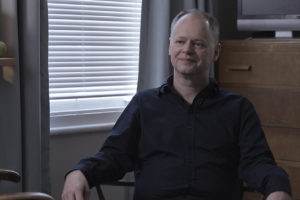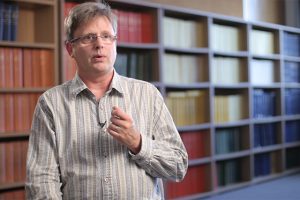The Nature of Language
Linguist David Adger on the similarities between all the languages, creation of the new grammatical rules and ...
My work is basically all about syntax, which is the way that we put words together to create meanings. Most people who do the kind of work that I do on syntax are interested in the ways that language varies when they do this. In English, you put the verb, and then you put the object; in Japanese, you put the object and then the verb; in Russian, you can put the object quite far away from the verb quite often. So languages vary in different kinds of ways, and people like me, syntacticians, are interested in what is system that humans have that does this variation. What is similar between an English speaker, a Russian speaker, a Chinese speaker and a Nunggubuyu speaker in how we build sentences from the basic bits and pieces we have?
The answer that people have given to that (the answer that I believe is true) is that what is really similar is that we, human beings, have the capacity to take discrete units, like words or sounds, and we put them together in hierarchical ways: you put them together in chunks, and those chunks are put together into larger chunks, and those larger chunks are put together in larger chunks, and we do this in a sort of unbounded fashion, that is we can just continue doing this following the rules of our particular language which is what makes our languages so creative. It’s what enables me to say the sentences I’m saying just now.
This is a very important part of language – the discrete, the hierarchical and the unbounded, the unending, – and that’s what most of my work’s about and that’s what most people who do what I do work on.
But actually, there’s more to language than this. So that is a fundamental aspect of the nature of language, but actually, when people think about language, they think about more than just this aspect of it. There’s something else: there’s the way we use language, what we use language to do. We don’t use language just to say literal things: you don’t just say, ‘I am sitting on a chair’; that would be pretty boring. What we do is we use language to express ourselves, we use it to express our thoughts, we use it to express how we’re feeling, we use it to express what kind of a person we are. That, I think, is another aspect of the nature of language that quite often gets lost from the perspective of people like me who focus very much on the theory of what human language really is as far as syntax and grammar and things like that go.
You’ll not be surprised, probably that it’s the latter. The case I want to tell you about is something that my colleague Jenny Cheshire noticed when she was looking at the data on teenage speakers from Hackney. The team collected loads and loads and loads of data and then analyzed it statistically. One of the things that Jenny was looking at is what’s called a relative clause, and that’s where I come in as a syntactician. A relative clause is when you take a noun like ‘the cat’, and then you add a clause after it, so you say ‘The cat that I love’ or ‘The dog that jumped on me’. So in English relative clauses, when they modify a name which is humans, like the man or the woman, say, ‘The woman who I saw’, you can say ‘The woman who I saw’ and also ‘The woman that I saw’, so you can say ‘who’ or ‘that’. You can also say ‘The woman I saw’, so there are three different ways of doing relative clauses, and they’re all completely normal in day-to-day English. Everyone uses them conversationally, just in a kind of random collection of ways when you have a human noun that you’re talking about.
So what Jenny noticed when she looked at this in the teenage speech of the children from Hackney is that, actually, they were using it differently than the speakers of other varieties of English do.
As I said, those three kinds of relative clause introduction (‘who’, ‘that’ and none) are not really grammatically organised in standard varieties of English. There are some prescriptive norms, like ‘If you’ve got a human you should use who’, so second-language speakers of English often get told that, but it’s just not true, that’s not what people do. People use ‘that’ and they use ‘who’.
So, in standard English, you use all of them, but what our team noticed with the Hackney teenagers is that they began to use ‘who’ when the person that the name referred to was an ongoing topic of the conversation. So if you imagine someone who’s really important to you and you say, ‘Oh, that man I met at the party’ or ‘That man who I met at the party’, and then you continue talking about him, ‘He was this guy that turned up late, and no one talked to him, and then when I saw him the next day…’ He gets talked about a lot; he’s an ongoing topic. Or you can imagine someone isn’t an ongoing topic: ‘When the bus blew up, and something terrible happened and everyone ran away…’ You don’t talk about the people again; you’re talking about something else.
What Jenny noticed was that these Hackney teenagers were structuring the two kinds of relative clauses in a completely different way than normal English. They were using ‘who’ when the noun was a topic of the ongoing discourse. You can count the number of times that that noun is referred back to, and the more that’s referred back to, the more likely it is that the person used ‘who’ in the relative clause.
Now, it turns out it’s even more interesting than this. So that’s a new rule, no one taught the kids this: it’s a new rule that they kind of worked out themselves. Where did it come from? That’s a really interesting question. It turns out that many of these various languages that are spoken by the kids (they’re not English) have ways of expressing topicality. Japanese, for example, uses a particular particle; Creoles have a particular way of changing the verb, so there are various kinds of ways that languages mark that. English doesn’t do that except for these Hackney kids.
So that’s really interesting because what it shows is the emergence of a new rule, and that new rule emerges through social factors. It emerges through the ways that people interact with each other, the ways that they want to be close to each other, and it’s done completely unconsciously: they don’t know they’re doing this. You can see it in the data if you look, you can see in the data that this new rule appeared, but they don’t know they’re doing this.
And that’s how all languages work. When I’m putting these sentences together right now, I don’t know what rules I’m using to put them together; I just put them together, and they work. I’m not conscious of the rules. I can make myself conscious because I’m a linguist and know a lot of those rules, but people can speak perfectly well without knowing them. What’s happening in this group of Hackney teenagers is they’ve innovated, they’ve added a new rule into their system, and that is as much part of the nature of language. This creation of new grammatical rules from social factors is the very nature of the rules themselves.

Linguist David Adger on the similarities between all the languages, creation of the new grammatical rules and ...

Physicist Martin McCall on electromagnetic induction, Ampere's experiments, and magnetic monopoles

Historian David L. Carrasco on violent practices of the Aztecs, the purpose of human sacrifice, and the select...